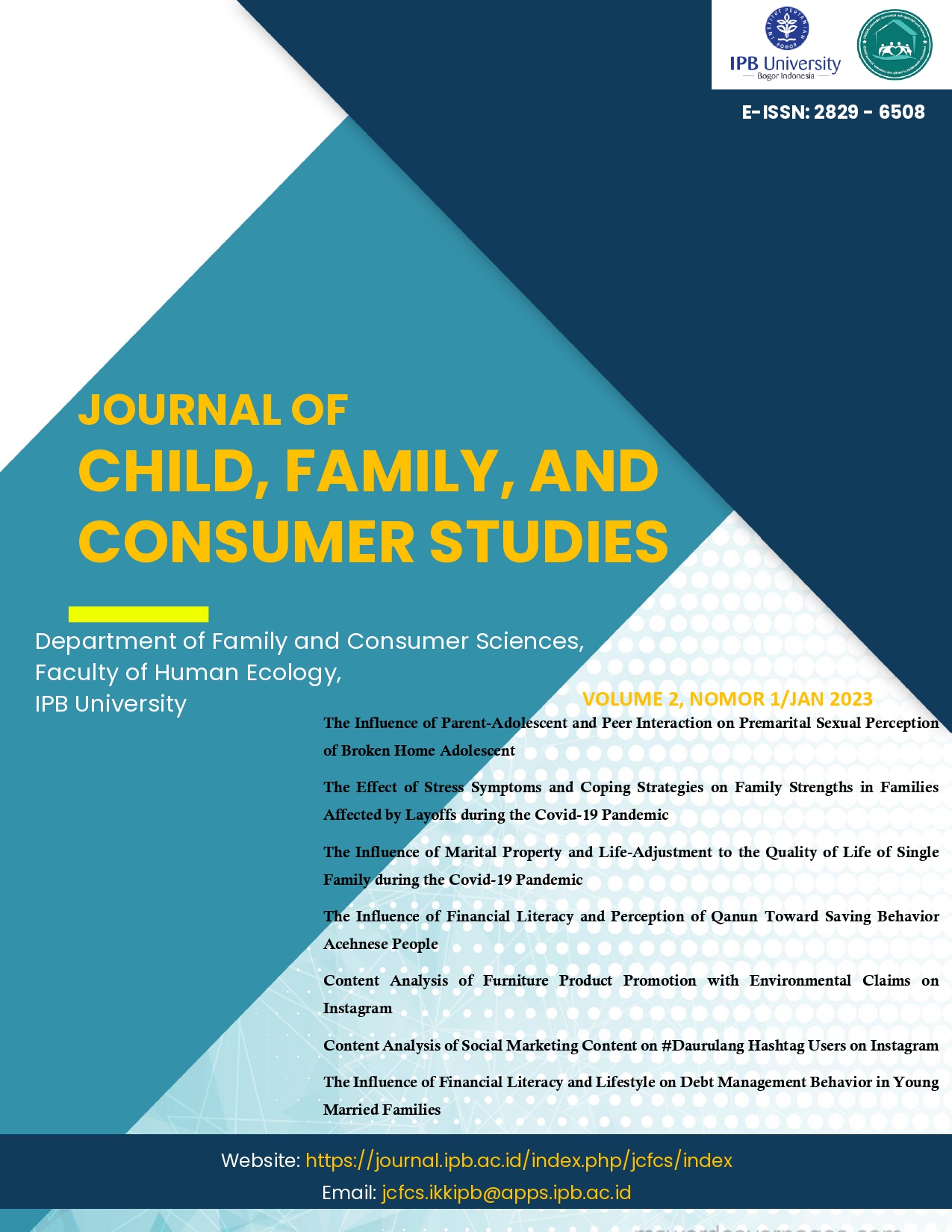THE INFLUENCE OF PARENT-ADOLESCENT AND PEER INTERACTION ON PREMARITAL SEXUAL PERCEPTION OF BROKEN HOME ADOLESCENT
Abstrak
Divorce in Indonesia continues to increase, resulting in an imbalance of family roles and functions. This imbalance has an impact on adolescents such as adolescent premarital sexual behavior. The purpose of this study is to identify the relationship and influence of parent-adolescent interaction and peer interaction on the perception of premarital sexuality in adolescents from broken home families. The method used in this study was purposive sampling method with online survey completion. The number of research samples was 190 adolescents from broken home families in the Jabodetabek area (Jakarta, Bogor, Depok, Tangerang and Bekasi). The relationship test shows that parent-adolescent interaction has a significant negative relationship with the premarital sexual perceptions of adolescents from broken home families. The results of the effect test show that parent-adolescent interaction has a significant negative effect on the premarital sexual perceptions of adolescents from broken home families, but peer interaction has a positive and insignificant effect on the sexual perceptions of adolescents from broken home families. It is expected that parents can be a discussion partner for adolescents in solving problems. Teenagers are expected to be able to choose a good friendship environment.
Referensi
Ardilla, A., & Cholid, N. (2021). Pengaruh Broken Home Terhadap Anak. Studia: Jurnal Hasil Penelitian Mahasiswa, 6(1), 1-14. DOI: https://doi.org/10.32923/stu.v6i1.1968
Arintina, Y. C., & Fauziah, N. (2015). Keharmonisan keluarga dan kecenderungan berperilaku agresif pada siswa SMK. Jurnal Empati, 4(1), 208-212. DOI: https://doi.org/10.14710/empati.2015.13142
Aryani, N. D. (2015). Hubungan orang tua-anak, penerimaan diri dan keputusasaan pada remaja dari keluarga broken home. Psychological Journal: Science and Practice, 3(1). https://202.52.52.7/index.php/pjsp/article/view/2172
[BKKBN] Badan Kependudukan dan Keluarga Berencana Nasional. (2019). Program Genre BKKBN Rangkul Anak Broken Home. Jakarta.
Bronfenbrenner, U., & Morris, P. A. (1998). The ecology of developmental processes.
Bukowski, W. M., Hoza, B., & Boivin, M. (1994). Measuring friendship quality during pre-and early adolescence: The development and psychometric properties of the Friendship Qualities Scale. Journal of social and Personal Relationships, 11(3), 471-484. https://doi.org/10.1177/0265407594113011
Risman, A., Wibhawa, B., & Fedryansyah, M. (2016). Kontribusi Pariwisata Terhadap Peningkatan Kesejahteraan Masyarakat Indonesia. Prosiding Penelitian Dan Pengabdian Kepada Masyarakat, 3(1). doi.org/10.24198/jppm.v3i1.13622
Darmayanti, D., Lestari, Y., & Ramadani, M. (2011). Peran teman sebaya terhadap perilaku seksual pra nikah siswa SLTA Kota Bukittinggi. Jurnal Kesehatan Masyarakat Andalas, 6(1), 24-27. https://doi.org/10.24893/jkma.v6i1.84
Hurlock, E. B. (1997). Psikologi Perkembangan Suatu pendekatan rentang kehidupan. Jakarta: Erlangga.
[KKI] Kebijakan Kesehatan Indonesia. 2019. BKKBN: Seks Bebas Kini Masalah Utama Remaja Indonesia. Jaringan Kebijakan Kesehatan Indonesia. Diunduh 2022 Jan12.
Krisnamurti, R. (2013). Pengaruh Pola Asuh Orang Tua dan Interaksi Teman Sebaya Terhadap Kecerdasan Emosi Siswa Kelas VB SD Negeri Pujokusuman 1 Tahun Ajaran 2012/2013. Skripsi. Fakultas Ilmu Pendidikan: Universitas Negeri Yogyakarta.
Kumar, G. A., Dandona, R., Kumar, S. G., & Dandona, L. (2011). Behavioral surveillance of premarital sex among never married young adults in a high HIV prevalence district in India. AIDS and Behavior, 15(1), 228-235. https://doi.org/10.1007/s10461-010-9757-1
Lange, A., Evers, A., Jansen, H., & Dolan, C. (2002). PACHIQ‐R: The parent‐child interaction questionnaire—Revised. Family process, 41(4), 709-722. https://doi.org/10.1111/j.1545-5300.2002.00709.x
Lestari, S. (2016). Psikologi Keluarga: Penanaman Nilai dan Penanaman Konflik dalam Keluarga. Prenada Media.
Lokadata. 2021. Perceraian di Indonesia terus meningkat. Lokadata.id. [Diunduh 2022 Mar 5]
Mubina, N., & Rahman, P. R. U. (2020). Pengaruh Interaksi Teman Sebaya Dan Kontrol Diri Terhadap Perilaku Seksual Pranikah Pada Remaja Di Kabupaten Karawang. Jurnal Ilmiah Penelitian Psikologi: Kajian Empiris & Non-Empiris, 6(2), 11-19.
Mariani, N. N., & Murtadho, S. F. (2018). Peran orang tua, pengaruh teman sebaya, dan sikap berhubungan dengan perilaku seksual pranikah pada siswa-siswi sma negeri 1 jamblang kabupaten cirebon. Jurnal Care, 6(2), 116-130.
Muttaqin, I., & Sulistyo, B. (2019). Analisis faktor penyebab dan dampak keluarga broken home. Raheema, Jurnal Studi Gender dan Anak, 6(2), 245-246.
Noroozi, M., Taleghani, F., Merghati-Khoei, E. S., Tavakoli, M., & Gholami, A. (2014). Premarital sexual relationships: Explanation of the actions and functions of family. Iranian Journal of Nursing and Midwifery Research, 19(4), 424-431. https://www.ncbi.nlm.nih.gov/pmc/articles/PMC4145500/
Permana, R. W. (2019). Berdasarkan Survei, 33 Persen Remaja Indonesia Pernah Melakukan Hubungan Seks Penetrasi. Diunduh 2022 Jan 12.
Pratama, R., Syahniar, S., & Karneli, Y. (2016). Perilaku agresif siswa dari keluarga broken home. Konselor, 5(4). https://doi.org/10.24036/02016546557-0-00
Puspitawati, H. (2006). Pengaruh faktor keluarga, lingkungan teman dan sekolah terhadap kenakalan pelajar di Sekolah Lanjutan Tingkat Atas (SLTA) di Kota Bogor.
Puspitawati, H. (2012). Gender dan keluarga: konsep dan realita di Indonesia. Bogor, Indonesia (ID): PT IPB Press.
Rachman, Y. A., Sunarti, E., & Herawati, T. (2020). Interaksi suami-istri, interaksi orang tua-anak, interaksi teman sebaya, dan resiliensi remaja. Jurnal Ilmu Keluarga & Konsumen, 13(1), 1-12. https://doi.org/10.24156/jikk.2020.13.1.1
Riany, Y. E., & Handayani, B. (2020). Peer Attachment, Fathering, Social Media Use and Perception of Premarital Sexual Attitude among Teenagers. Journal of Family Sciences, 5(2), 121-137. https://doi.org/10.29244/jfs.v5i2.33274
Rochaniningsih, N. S. (2014). Dampak pergeseran peran dan fungsi keluarga pada perilaku menyimpang remaja. Jurnal Pembangunan Pendidikan: Fondasi dan Aplikasi, 2(1). 59-71. http://dx.doi.org/10.21831/jppfa.v2i1.2618
Rosdarni, R., Dasuki, D., & Waluyo, S. D. (2015). pengaruh faktor personal berpengaruh terhadap perilaku seksual pranikah pada remaja di Kota Kendari Provinsi Sulawesi Tenggara. Kesmas: Jurnal Kesehatan Masyarakat Nasional (National Public Health Journal), 9(3), 214-221. http://dx.doi.org/10.21109/kesmas.v9i3.567
Saikia, R. (2017). Broken family: Its causes and effects on the development of children. International journal of applied research, 3(2), 445-448.
Santrock, J. W. (2007). Remaja, jilid 2 edisi kesebelas. Jakarta, Indonesia (ID): Erlangga.
Santrock, J. W. (2003). Adolescence: perkembangan remaja.
Sarwono, J., Larasati, A. E., Novianto, W. N. I., Sihar, I., & Utami, S. S. (2015). Simulation of several open plan office design to improve speech privacy condition without additional acoustic treatment. Procedia-Social and Behavioral Sciences, 184, 315-321. https://doi.org/10.1016/j.sbspro.2015.05.096
Satata, D. B. M. (2021). Self-Disclosure Sifat Independen Anak Tunggal pada Keluarga Broken Home. Jurnal Psikologi Perseptual, 6(1), 53-65. https://jurnal.umk.ac.id/index.php/perseptual
Savitra K. 2017. 8 Penyebab keluarga tidak harmonis dan solusinya. [Diunduh 2021 Oktober 20].
Sena, F. Y., Elita, Y., & Misbahuddin, A. (2021). Hubungan Antara Kontrol Diri Pada Siswa Broken Home Dengan Pergaulan Bebas Siswa Kelas Xi Smk Negeri X Kota Bengkulu. Triadik, 20(1), 35-43. https://ejournal.unib.ac.id/index.php/triadik/article/download/16469/7947
Sieving, R. E., McRee, A. L., McMorris, B. J., Shlafer, R. J., Gower, A. L., Kapa, H. M., ... & Resnick, M. D. (2017). Youth–adult connectedness:: a key protective factor for adolescent health. American journal of preventive medicine, 52(3), S275-S278. https://doi.org/10.1016/j.amepre.2016.07.037
Sugiyono, S. (2018). Metode Penelitian Kualitatif untuk Penelitian yang Bersifat: Eksploratif, Enterpretif, Interaktif dan Konstruktif. Bandung: CV. Alfabeta.
Suparmi, S., & Isfandari, S. (2016). Peran teman sebaya terhadap perilaku seksual pranikah pada remaja laki-laki dan perempuan di Indonesia. Indonesian Bulletin of Health Research, 44(2), 139-146. https://www.neliti.com/publications/67963/peran-teman-sebaya-terhadap-perilaku-seksual-pranikah-pada-remaja-laki-laki-dan#cite
Suprapti, Z. (2011). Mengatasi Kenakalan Remaja Pada Siswa Broken Home Melalui Konseling Realita di SMA Negeri 4 Pekalongan.
Susilowati, A. Y., & Susanto, A. (2020). Strategi penyelesaian konflik dalam keluarga di masa pandemi covid-19. Hasanuddin Journal of Sociology (HJS), 2(2), 88-97. https://journal.unhas.ac.id/index.php/HJS
Wang, B., Stanton, B., Deveaux, L., Li, X., & Lunn, S. (2015). Dynamic relationships between parental monitoring, peer risk involvement and sexual risk behavior among Bahamian mid-adolescents. International Perspectives on Sexual and Reproductive Health, 41(2), 89. https://doi.org/10.1363%2F4108915
Yolanda, R., Kurniadi, A., & Tanumihardja, T. N. (2019). Faktor-faktor yang berhubungan dengan sikap remaja terhadap perilaku seksual pranikah di Kecamatan Siberut Selatan, Kepulauan Mentawai tahun 2018. Jurnal Kesehatan Reproduksi, 10(1), 69-78. http://ejournal2.litbang.kemkes.go.id/index.php/kespro/article/view/2174










